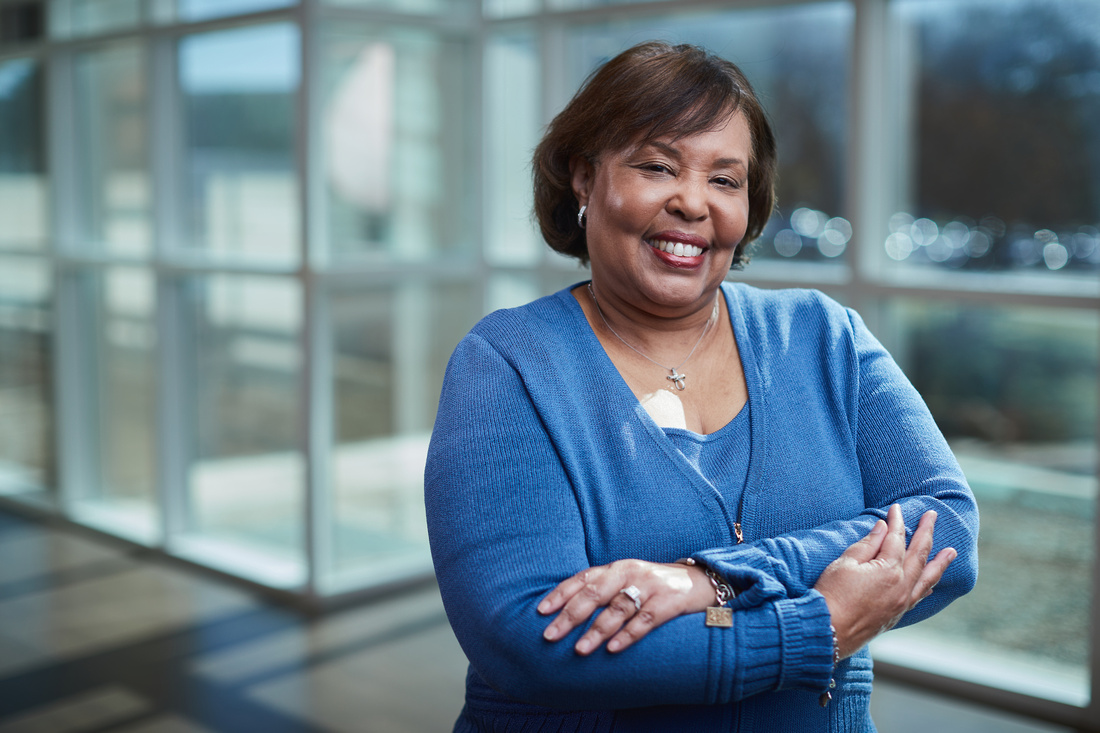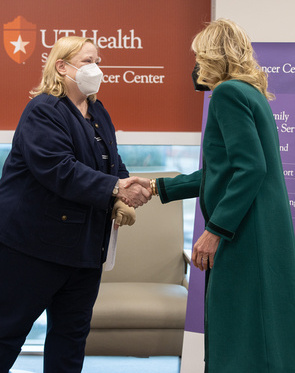The provision of patient-centered care


— Gwendolyn Tate, MBA, MSN, RN, NEA-BC, Chief Nursing Officer
Cancer care needs a care team approach
Total cancer care encompasses far more than the provision of today’s leading treatments. The mission of the Mays Cancer Center — to decrease the burden of cancer in San Antonio, South Texas and beyond — includes a range of wellness and support services that comfort patients and their loved ones. The focus on comprehensive, evidence-based patient care centers on a care team structure to meet the needs of all patients at each stage of treatment.
The center’s patient and family services department coordinates services that make healing easier. The care team structure includes everything from nutrition counseling with a registered dietitian to emotional support with a licensed clinical psychologist to physical therapy to help patients regain strength and mobility. Cancer support groups, wellness programs, classes and survivorship services likewise contribute to the center’s comprehensive focus on health and healing.
Focus on prevention
An area of growing interest is genetic testing and counseling services available through the center’s Cancer Genetics Program and high-risk screening clinic.
“While genetic testing has been around for quite a few years, its use in analysis for increased risk represents a newer front in the fight against cancer,” said Lauren Mills, MS, CGC, a certified genetic counselor for the Mays Cancer Center.
Genetic testing to determine if someone is predisposed to cancer can be beneficial in an area like South Texas where there are higher rates of certain cancers like liver cancer, said Mills.
“Especially for breast and ovarian cancer, or colon, prostate or uterine cancer — if you have had cancer at a young age, generally under 50, or if there is a family history of cancer under 50 — finding out if you are at a higher risk than the general population can allow you to be as proactive as possible,” said Mills. “Earlier screening can allow early prevention measures including frequent monitoring for development of any tumors.”
Oncology rehabilitation
Another service area of significant growth at the Mays Cancer Center is its oncology rehabilitation program, providing therapy services and pain and symptom management to help patients prepare for treatment, decreasing the burden of long-term side effects after cancer treatment.
“Oncology rehabilitation at Mays Cancer Center is a medical subspecialty out of physical medicine and rehabilitation, and our focus is on working with cancer patients and bringing foundational rehab principles to those patients,” said Brian Fricke, MD, director of oncology rehabilitation.
“Many of the common side effects or symptoms that patients with cancer can face after treatment include things like chemotherapy-related neuropathy that can cause a lot of pain or decrease in sensation of the limbs,” he said. “Other symptoms include radiation fibrosis syndrome, where people lose range of motion in certain joints as a result of the scarring that happens within the muscle tissue, and lymphedema, where patients will have abnormal swelling of the limb as the result of damage to the lymphatic system.”
“It’s my goal to empower those battling cancer to take control of their cancer journey — through physical activity, nutritional support and mindfulness techniques — to live a life not defined by their cancer diagnosis.”
— Brian Fricke, MD, Assistant Professor, Director of Oncology Rehabilitation
Four stages of rehabilitation
Fricke outlines four stages of oncology rehabilitation that are the focus of the center’s program:
Preventive: Improving baseline function and identifying where intervention can improve exercise and overall nutrition level to help build a functional cushion as patients prepare for cancer treatments.
Restorative: Restoring as much function as possible and identifying any barriers to a patient’s engagement in therapy.
Supportive: Preserving function and slowing a patient’s decline.
Palliative: Optimizing a patient’s quality of life to allow patients to engage with loved ones for as long as possible. Social function is a top priority, including training family members to take care of their loved ones and transport them safely.
“It’s appropriate to start rehabilitation in any phase, from the time of diagnosis all the way through to end of life,” said Fricke. “There are many things we can do as rehabilitation specialists and experts to support someone’s physical function, mental function and their overall quality of life.”
For Fricke, the uptick in the need for oncology rehabilitation services is a positive development.
“Advancements in cancer research and treatments have largely contributed to the challenges we now face in the world of oncologic rehab,” said Fricke. “How do we help survivors return to their prior level of function and quality of life? We’re now asking this question because of the successes of newer cancer treatments prolonging lives and, in many cases, beating cancer.”

meets first lady Jill Biden.
The value of ongoing care and therapy
San Antonio lawyer Cynthia Orr was diagnosed with breast cancer in 2013. Her treatment included the removal of lymph nodes in her armpit. Nine years later, in 2020, she developed lymphedema after a single cut on her hand. Anton Fries, MD, PhD, a reconstructive microsurgeon at UT Health San Antonio, transplanted lymph nodes from Orr’s stomach to help restore her circulation. Orr has since been a patient of Brian Fricke, MD, Mays Cancer Center director of oncology rehabilitation, for her ongoing therapy.
Read more stories from our 2022 Annual Report.
Learn more about our Cancer Genetics, Patient and Family Services and Cancer Rehabilitation Programs.

 Close
Close